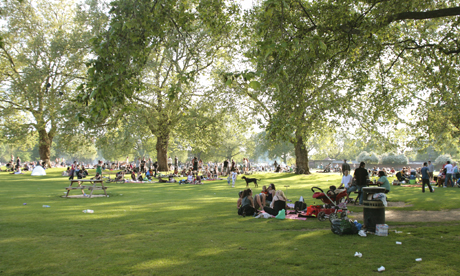Plans afoot for London Fields community council

London Fields: a community council may be on the way. Photo: Hackney Citizen
Local residents are plotting to introduce grassroots democracy to London Fields. At a meeting to be held on 15 February, interested citizens will be getting together to discuss plans for an elected local council in their neighbourhood.
This community council might take charge of matters such as planning, crime reduction, parks, leisure facilities and street cleaning.
In 2008 changes were made to the law, giving Londoners the option of forming community councils – bodies that have the same powers as parish and town councils in other parts of England. Local authorities are obliged to consider proposals for community councils if petitioned to do so by ten per cent of local people. Such a council is then elected through the usual polling process.
Community councils are funded by an additional council tax known as a ‘precept’, which is paid by all those living in the relevant area.
The man behind the London Fields initiative is Conservative member of the London Assembly Andrew Boff, who lives near Broadway Market.
A community council in London Fields could give residents “more influence over the things that matter,” claims Boff.
There have been no statutory local councils in the capital since the 1960s, and Boff is enthusiastic about what such a council might achieve.
“A community council can set up youth facilities (much under- resourced in London Fields), get local consent for any future road works, address a shortage of child care facilities, or set up a transition town strategy to address climate change,” he said.
Asked how much more residents would have to pay in council tax if the community council is set up, he replied that “in order for there to be real, visible change in London Fields, residents would expect to pay an extra £20-30 in addition their council tax.”
Full interview with Andrew Boff AM here:
How will the community council engage in the community?
“It will be the local people. The chances are that you will know your local community councillor. The position is unpaid and so won’t be attractive to careerists and all the councillors will have to live in the area. All the Hackney Borough Councillors for Queensbridge Ward, which forms the bulk of the proposed new Council, live well outside the area which creates an obstacle for them to engage with local people. The current sham of public consultation – the neighbourhood forums – covers too large an area for people to be attracted by the subjects debated.”
Why another public body, why not the ‘Big Society’? Does the introduction of another public body not fly in face of Conservative party policy?
“This IS the big society! It’s about local people claiming a stake in their communities and bringing on board all local interest groups and giving them the power to shape their areas without having to be constantly dependent upon the largesse of the Borough. Big society people have been around for decades in Hackney. Unfortunately they’ve had a big bureaucracy at Hackney Town Hall stifling their goodwill.”
Do we really need another council, won’t it just cost money we haven’t got at the moment?
“Community Councils are the first tier of local government, the one closest to the people. Their absence in Greater London since 1964 has resulted in people feeling quite remote from the decisions being made in their name.
“There are already 9000 such Councils in the rest of England despite the fact that local residents have the power to abolish them if they feel like they aren’t being effective. But they keep them because of the substantial advantage they have in looking after the interest of the local community, of having the right to comment on planning applications and the stewardship they have over the immediate environment of a locality. The councils have to raise their own resources and the councillors will be unpaid.
Who would be interested in sitting on this council, given that political parties have a hard enough time finding suitable people to stand for election to borough councils?
“It’s the party politics that puts most people off. Community councils encourage independents to come forward whose loyalty is to the the locality, not ideology. I’ll be trying to persuade all the parties not to put forward slates of candidates. A great number of such councils are party-free zones!
“Also, people don’t get involved because they don;t think that being involved will change anything.
What would this council do that Hackney Council cannot do?
“Primarily – understand local priorities. It’s what Hackney is choosing not to do that is the problem. A Community Council can set up youth facilities (much under resourced in London Fields!), get local consent for any future road works, address a shortage of child care facilities, set up a transition town strategy to address climate change… the choices are down to the community council.
How would it be funded, wouldn’t this require another council tax? Can we really afford it?
“They can fund themselves through fees and charges (from, for example, allotments, leisure facilities), a cut in the community infrastructure levy on developments in the area or through a small precept added to the Council Tax demand.
How much more exactly will residents have to pay in council tax if the Community Council is set up?
“That is up to the residents. But I would say that in order for there to be real, visible change in London Fields, residents would expect to pay an extra £20-30 on there council tax.
Is this power to the people through ‘Big Society’ in action? Or just another tax?
“Community councils have the power, and a budget, to deliver real local changes and are local enough so that they can’t ignore the will of the people.”
